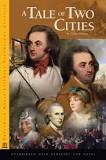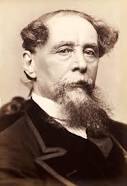A Tale of Two Cities Page #5
A Tale of Two Cities is a historical novel by Charles Dickens, set in London and Paris before and during the French Revolution.
Very orderly and methodical he looked, with a hand on each knee, and a loud watch ticking a sonorous sermon under his flapped waist-coat, as though it pitted its gravity and longevity against the levity and evanescence of the brisk fire. He had a good leg, and was a little vain of it, for his brown stockings fitted sleek and close, and were of a fine texture; his shoes and buckles, too, though plain, were trim. He wore an odd little sleek crisp flaxen wig, setting very close to his head: which wig, it is to be presumed, was made of hair, but which looked far more as though it were spun from filaments of silk or glass. His linen, though not of a fineness in accordance with his stockings, was as white as the tops of the waves that broke upon the neighbouring beach, or the specks of sail that glinted in the sunlight far at sea. A face habitually suppressed and quieted, was still lighted up under the quaint wig by a pair of moist bright eyes that it must have cost their owner, in years gone by, some pains to drill to the composed and reserved expression of Tellson's Bank. He had a healthy colour in his cheeks, and his face, though lined, bore few traces of anxiety. But, perhaps the confidential bachelor clerks in Tellson's Bank were principally occupied with the cares of other people; and perhaps second-hand cares, like second-hand clothes, come easily off and on. Completing his resemblance to a man who was sitting for his portrait, Mr. Lorry dropped off to sleep. The arrival of his breakfast roused him, and he said to the drawer, as he moved his chair to it: “I wish accommodation prepared for a young lady who may come here at any time to-day. She may ask for Mr. Jarvis Lorry, or she may only ask for a gentleman from Tellson's Bank. Please to let me know.” “Yes, sir. Tellson's Bank in London, sir?” “Yes.” “Yes, sir. We have oftentimes the honour to entertain your gentlemen in their travelling backwards and forwards betwixt London and Paris, sir. A vast deal of travelling, sir, in Tellson and Company's House.” “Yes. We are quite a French House, as well as an English one.” “Yes, sir. Not much in the habit of such travelling yourself, I think, sir?” “Not of late years. It is fifteen years since we--since I--came last from France.” “Indeed, sir? That was before my time here, sir. Before our people's time here, sir. The George was in other hands at that time, sir.” “I believe so.” “But I would hold a pretty wager, sir, that a House like Tellson and Company was flourishing, a matter of fifty, not to speak of fifteen years ago?” “You might treble that, and say a hundred and fifty, yet not be far from the truth.” “Indeed, sir!” Rounding his mouth and both his eyes, as he stepped backward from the table, the waiter shifted his napkin from his right arm to his left, dropped into a comfortable attitude, and stood surveying the guest while he ate and drank, as from an observatory or watchtower. According to the immemorial usage of waiters in all ages. When Mr. Lorry had finished his breakfast, he went out for a stroll on the beach. The little narrow, crooked town of Dover hid itself away from the beach, and ran its head into the chalk cliffs, like a marine ostrich. The beach was a desert of heaps of sea and stones tumbling wildly about, and the sea did what it liked, and what it liked was destruction. It thundered at the town, and thundered at the cliffs, and brought the coast down, madly. The air among the houses was of so strong a piscatory flavour that one might have supposed sick fish went up to be dipped in it, as sick people went down to be dipped in the sea. A little fishing was done in the port, and a quantity of strolling about by night, and looking seaward: particularly at those times when the tide made, and was near flood. Small tradesmen, who did no business whatever, sometimes unaccountably realised large fortunes, and it was remarkable that nobody in the neighbourhood could endure a lamplighter. As the day declined into the afternoon, and the air, which had been at intervals clear enough to allow the French coast to be seen, became again charged with mist and vapour, Mr. Lorry's thoughts seemed to cloud too. When it was dark, and he sat before the coffee-room fire, awaiting his dinner as he had awaited his breakfast, his mind was busily digging, digging, digging, in the live red coals. A bottle of good claret after dinner does a digger in the red coals no harm, otherwise than as it has a tendency to throw him out of work. Mr. Lorry had been idle a long time, and had just poured out his last glassful of wine with as complete an appearance of satisfaction as is ever to be found in an elderly gentleman of a fresh complexion who has got to the end of a bottle, when a rattling of wheels came up the narrow street, and rumbled into the inn-yard. He set down his glass untouched. “This is Mam'selle!” said he. In a very few minutes the waiter came in to announce that Miss Manette had arrived from London, and would be happy to see the gentleman from Tellson's. “So soon?” Miss Manette had taken some refreshment on the road, and required none then, and was extremely anxious to see the gentleman from Tellson's immediately, if it suited his pleasure and convenience. The gentleman from Tellson's had nothing left for it but to empty his glass with an air of stolid desperation, settle his odd little flaxen wig at the ears, and follow the waiter to Miss Manette's apartment. It was a large, dark room, furnished in a funereal manner with black horsehair, and loaded with heavy dark tables. These had been oiled and oiled, until the two tall candles on the table in the middle of the room were gloomily reflected on every leaf; as if they were buried, in deep graves of black mahogany, and no light to speak of could be expected from them until they were dug out. The obscurity was so difficult to penetrate that Mr. Lorry, picking his way over the well-worn Turkey carpet, supposed Miss Manette to be, for the moment, in some adjacent room, until, having got past the two tall candles, he saw standing to receive him by the table between them and the fire, a young lady of not more than seventeen, in a riding-cloak, and still holding her straw travelling-hat by its ribbon in her hand. As his eyes rested on a short, slight, pretty figure, a quantity of golden hair, a pair of blue eyes that met his own with an inquiring look, and a forehead with a singular capacity (remembering how young and smooth it was), of rifting and knitting itself into an expression that was not quite one of perplexity, or wonder, or alarm, or merely of a bright fixed attention, though it included all the four expressions--as his eyes rested on these things, a sudden vivid likeness passed before him, of a child whom he had held in his arms on the passage across that very Channel, one cold time, when the hail drifted heavily and the sea ran high. The likeness passed away, like a breath along the surface of the gaunt pier-glass behind her, on the frame of which, a hospital procession of negro cupids, several headless and all cripples, were offering black baskets of Dead Sea fruit to black divinities of the feminine gender--and he made his formal bow to Miss Manette.
Translation
Translate and read this book in other languages:
Select another language:
- - Select -
- 简体中文 (Chinese - Simplified)
- 繁體中文 (Chinese - Traditional)
- Español (Spanish)
- Esperanto (Esperanto)
- 日本語 (Japanese)
- Português (Portuguese)
- Deutsch (German)
- العربية (Arabic)
- Français (French)
- Русский (Russian)
- ಕನ್ನಡ (Kannada)
- 한국어 (Korean)
- עברית (Hebrew)
- Gaeilge (Irish)
- Українська (Ukrainian)
- اردو (Urdu)
- Magyar (Hungarian)
- मानक हिन्दी (Hindi)
- Indonesia (Indonesian)
- Italiano (Italian)
- தமிழ் (Tamil)
- Türkçe (Turkish)
- తెలుగు (Telugu)
- ภาษาไทย (Thai)
- Tiếng Việt (Vietnamese)
- Čeština (Czech)
- Polski (Polish)
- Bahasa Indonesia (Indonesian)
- Românește (Romanian)
- Nederlands (Dutch)
- Ελληνικά (Greek)
- Latinum (Latin)
- Svenska (Swedish)
- Dansk (Danish)
- Suomi (Finnish)
- فارسی (Persian)
- ייִדיש (Yiddish)
- հայերեն (Armenian)
- Norsk (Norwegian)
- English (English)
Citation
Use the citation below to add this book to your bibliography:
Style:MLAChicagoAPA
"A Tale of Two Cities Books." Literature.com. STANDS4 LLC, 2024. Web. 24 Nov. 2024. <https://www.literature.com/book/a_tale_of_two_cities_19>.




Discuss this A Tale of Two Cities book with the community:
Report Comment
We're doing our best to make sure our content is useful, accurate and safe.
If by any chance you spot an inappropriate comment while navigating through our website please use this form to let us know, and we'll take care of it shortly.
Attachment
You need to be logged in to favorite.
Log In